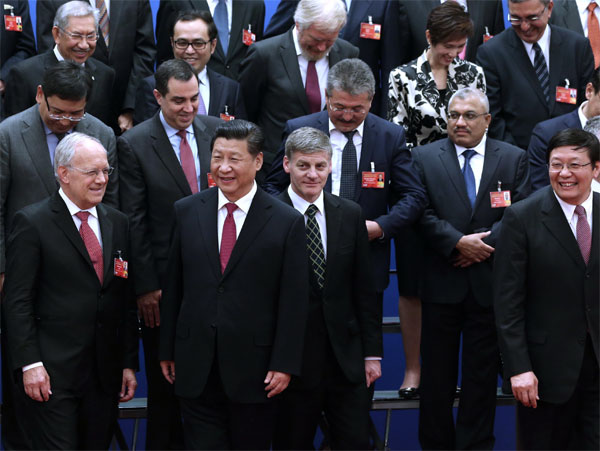Bank framework is signed
Updated: 2015-06-30 11:06
By Zheng Yangpeng and Zhao Shengnan in Beijing and Chen Weihua in Washington(China Daily USA)
|
||||||||
|
President Xi Jinping joins with envoys of governments that signed onto the Chinese-led Asian Infrastructure Investment Bank at the Great Hall of the People in Beijing on Monday. [Photo by Wu Zhiyi / China Daily] |
Xi: AIIB's 57 members to adhere to standards of efficiency, transparency
The China-initiated Asian Infrastructure Investment Bank (AIIB) took a historic step forward on Monday with the signing of a framework for the current 57-member institution.
"The signing of the document reveals the commitment of the parties involved in the founding of the AIIB ... and China will work with the other members to ensure the AIIB adheres to the highest standards in professionalism, efficiency and transparency," President Xi Jinping told representatives of the founding countries who gathered in Beijing to sign the agreement.
The AIIB, which was proposed by Xi in October 2013, is the first major multilateral lender with developing countries holding the majority of the shares and votes.
The bank will have authorized capital of $100 billion. China has a 30.34 percent stake in it and 26.06 percent of the votes, according to the agreement. India and Russia are the second- and third-largest shareholders.
Seventy-five percent of the shares are distributed among countries within the Asian region. As the bank expands its membership, countries beyond the region can expand their share up to 30 percent, so China's shares could be diluted.
China's Finance Minister Lou Jiwei said the 60-article agreement serves as the bank's "mini-constitution" that underpins the fundamental principles for its establishment and operation.
The signing wrapped up six months of intense behind-the-scenes negotiations and paved the way for establishing the bank before year-end.
The bank would be legally valid if more than 10 founding members pass the agreement in their legislatures, and if they represent not less than 50 percent of the total subscribed capital.
Beijing said that although China will nominate its candidate for bank president - whom most members expect has the largest chance to win - China does not seek to monopolize the post.
Lou said that member countries are now being required to submit a list of projects.
He also said that AIIB funds will take local people's willingness into consideration.
"The AIIB will learn from existing multilateral development banks' good practices, including respect for the willingness of the local population. In many cases, government wants a project while local people don't," Lou said.
The bank's board of directors will not be required to live in Beijing, and the chance to supply materials for projects will be open to all countries, not just members.
There has been criticism of the World Bank arrangement of a resident board that approves all loans. The resident board is both a large financial cost to the bank ($70 million per year) and an extra layer of management that slows down project preparation and makes the bank less efficient, David Dollar, a senior fellow at the Brookings Institution, wrote last month on the East Asia Forum website, quoting a report by Ernesto Zedillo, former president of Mexico, who chaired the High-Level Commission on Modernization of World Bank Group Governance.
With the signing of the legal framework for the bank, experts said the focus is now shifting to how China can show its leadership in the bank, roll out the first project and fulfill its commitment of a "lean, clean and green" bank.
"The formal inception of the AIIB is a landmark event in global finance as it signals that China is beginning to take a leadership role in international governance rather than being a passive participant in the international monetary system," said Eswar Prasad, a professor of international economics and trade policy at Cornell University.
Prasad said some of the US concerns about the governance and transparency of the AIIB should be assuaged by the final articles of agreement, although the key question is of course how these will be implemented once the AIIB commences its lending operations.
"The US may have little choice but to follow the lead of its advanced economy counterparts in participating in the AIIB to influence its operations from the inside rather than lobbing criticisms at the institution from the outside," said Prasad, a former IMF China Division chief.
Paolo Mauro, a senior fellow at the Peterson Institute for International Economics, said the need for infrastructure investment in Asia's emerging economies is vast.
Mauro and his colleague Tomas Hellebrandt estimated that average household income in Asia's emerging economies will double over the next two decades, spending on transportation will quadruple.
Mauro said that the US and China have a common interest in ensuring both that economic growth in Asia remains strong and that CO2 emissions are curbed. "The two countries are also seeking concrete initiatives that will showcase their ability to work together," he said, citing the climate deal last November.
"By participating in the AIIB, advanced economies will be able to influence its operations, ensure that its processes are transparent, and put in place incentives for projects that preserve the world's natural resources and control climate change. The United States is well placed to play a constructive role in that endeavor," Mauro said.
"I would favor the US joining AIIB but do not expect it to happen until a few years from now," Dollar said.
Contact the writer at zhengyangpeng@ chinadaily.com.cn and chenweihua@chinadailyusa.com
- Health survey finds Chinese people have grown taller, stronger
- State Council demands accelerated housing renovation
- East China's 'most beautiful' high-speed rail opens
- Uygur family saves Han orphan
- Tourists amazed by artificial water cascades in Henan
- Greater independence needed to increase effectiveness of Chinese think tanks
- Japan's Diet gets 1.65m signatures against security bills
- Thailand's first MERS case declared free of deadly virus
- US, New Zealand to discuss Pacific co-op
- Beijing and Brussels unlikely to reach consensus on investment synergy
- Hollande, Essebsi vow 'solidarity against terrorism' after attacks
- French beheading suspect was 'normal neighbour'

 Homes on the wheels
Homes on the wheels
 Ten photos you don't wanna miss - June 30
Ten photos you don't wanna miss - June 30
 Man makes run for the money with business
Man makes run for the money with business
 1,000 students sleep in gym to avoid summer heat
1,000 students sleep in gym to avoid summer heat
 China betting big on these 10 industries
China betting big on these 10 industries
 Political ambition
Political ambition
 7 ways to make graduation travel more memorable
7 ways to make graduation travel more memorable
 Rides that turned deadly at amusement parks
Rides that turned deadly at amusement parks
Most Viewed
Editor's Picks

|

|

|

|

|

|
Today's Top News
Bank framework is signed
Li sees Sino-EU economic bond as vital to growth
Obama signs trade bills into law, giving boost to TPP talks
Student arrested for killing girlfriend after China-US operation
Chinese space station for civilian use: Argentina
AIIB shows world’s economic center moving East: Opinion
European visit to find economic synergies
Disney bans selfie sticks at theme parks over safety concerns
US Weekly

|

|







